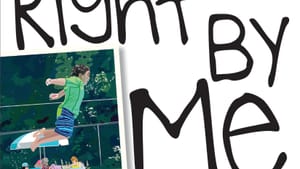Stay in the Loop
BSR publishes on a weekly schedule, with an email newsletter every Wednesday and Thursday morning. There’s no paywall, and subscribing is always free.
Adoption in black and white
‘Do Right By Me,’ by Valerie I. Harrison and Kathryn Peach D’Angelo

At heart, Do Right By Me: Learning to Raise Black Children in White Spaces is about walking in someone else’s shoes. The authors, educators Valerie I. Harrison and Kathryn Peach D’Angelo, became close friends as Temple University coworkers and doctoral students. Harrison, a lawyer with a Ph.D. in African American studies, is Black. D’Angelo, who holds a doctorate in education, is white.
The friends’ frank discussions on race took on new meaning in 2011, when D’Angelo and her husband Mike D’Angelo adopted a biracial newborn, Gabriel. Do Right By Me explores the experience of white parents trying to prepare their Black child for a world the parents have not experienced: one that is less welcoming, less forgiving, and less just.
Adoption in the community
As Gabriel’s devoted “Aunt Val,” Harrison notes that Black people define immediate family expansively: “The core [African American] family includes not only parents and siblings but also grandparents, aunts, uncles, and cousins, all of whom may live in the same household or in nearby communities.… Biology is simply less important than relationship.”
Transracial adoptees need a community that reflects them, D’Angelo says. “Families must intentionally enable a healthy racial identity.” For the sake of their child, white parents raised in predominantly white schools, congregations, and neighborhoods must seek diverse spaces, even if they’re uncomfortable doing so.
“If parents don’t work on constructing a positive Black self-identity for their children,” Harrison writes, “our culture will construct a self-identity around their blackness for them.” And it will be replete with common stereotypes used for centuries to justify racism.
When the D’Angelos signed up four-year-old Gabriel for soccer with an all-white team, he wouldn’t play, despite its welcoming atmosphere. When the family found a league with diverse teammates, the child’s reluctance vanished. “Exclusion doesn’t need to be practiced to be felt,” D’Angelo observes. “Mike and I marveled at how feelings of inclusion and exclusion for Gabe began to take shape at such a young age.”
A conversation between friends
Drawing on a range of academic studies, Harrison and D’Angelo support their points with facts, distilling research for lay readers and offering further reading for those who want it. The issues they raise transcend cross-racial adoption to penetrate society’s most intransigent problems: structural racism, housing and healthcare inequity, resource-starved public schools, and an inherently biased justice system.
It’s like listening in on a thought-provoking, fearlessly honest conversation between good friends. Organized in alternating passages, thumbnail caricatures by Susan Jarvis Ragland provide visual cues to who’s speaking at any point. Writing with passion and humor, D’Angelo and Harrison use recognizable milestones—choosing a pediatrician, evaluating a preschool, corresponding with the principal, attending a classmate’s birthday party—to open discussions incorporating psychology, history, culture, and racism.
Inevitable confrontations
Transracial adoption affects many groups. According to the Institute on Family Studies, 90 percent of Asian adoptees, 62 percent of Hispanic adoptees, and 64 percent of multiracial adoptees are raised by parents of ethnicities different from their own. All of them will face some of the challenges explored in Do Right By Me.
Those adopting a Black child have an additional fear: they must anticipate that at some point, their child will be confronted by police, whether in a car, a store, or another ambiguous situation. And they must coach their child on how to respond.
Harrison recalls attending elementary school assemblies in which Black police officers reminded the Black student body to be “respectful of authority.” She recounts repeatedly being pulled over as she drove to Villanova University’s suburban campus, where she was a law student. As a precaution for the commute, Harrison used to position her legal textbooks on the front seat, in full view.
“The talk”
D’Angelo writes that she and her husband will have “the talk” with Gabriel, and she denies the myth of a post-racial society. They’ll tell their son that while not everyone is racist, almost everyone (even loved ones) carries a degree of bias. “Parents of white children need to do more than promote colorblindness,” she adds. That means “thoughtfully and carefully” explaining that seemingly normal youthful hijinks like speeding, underage drinking, running through neighbors’ yards or sneaking into pools, or playing with plastic guns in the park may seem harmless, but they “place my Black son at risk.”
As transracial adoptive parents need to envision the world their child inhabits, and caring friendships expand perspectives, Harrison and D’Angelo demonstrate the difficulty, but also the reward, of intentionally seeing things from another person’s point of view.
Image description: The cover of the book Do Right By Me, by Valerie I. Harrison and Kathryn Peach D’Angelo. It has black text reminiscent of a child’s handwriting on a white background, and a small image that is a painting of a child with light brown skin jumping into a pool.
What, When, Where
Do Right by Me: Learning to Raise Black Children in White Spaces. By Valerie I. Harrison and Kathryn Peach D’Angelo. Philadelphia: Temple University Press, 2021. 192 pages, softcover, $20. Get it from Temple University Press.
Valerie I. Harrison and Kathryn Peach D’Angelo will participate in a streamed Free Library of Philadelphia author event on February 4, 2021, moderated by journalist Tracey Matisak.
Sign up for our newsletter
All of the week's new articles, all in one place. Sign up for the free weekly BSR newsletters, and don't miss a conversation.
